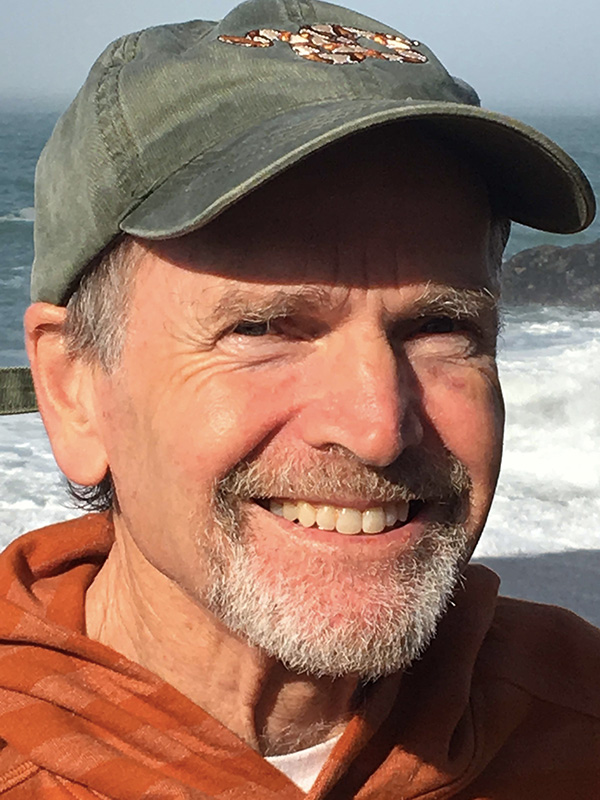
On June 13, we lost our beloved and brilliant friend, mentor, and colleague – Dr. Steven Morgan. Steven was Professor Emeritus in the Department of Environmental Science and Policy at UC Davis and spent over 20 years based at Bodega Marine Laboratory (BML). His pioneering work in marine ecology spanned four decades, during which he reshaped our understanding of larval dispersal, life-history evolution, the foundational processes that structure marine communities, and conservation ecology. As a teacher, mentor, collaborator, and fellow citizen, Steven’s legacy extends far beyond the boundaries of his own research.
Steven earned his Ph.D. in Zoology from the University of Maryland in 1986, after completing an M.S. in Biological Oceanography at Old Dominion University and a B.S. in Biology at Randolph-Macon College. His academic path was marked by an immediate and deep fascination with the mysteries of marine life, especially the complex and elusive journeys of minuscule marine larvae. Steven’s early work on larval biology in Chesapeake Bay revealed an intuitive grasp of larval behavior that set him apart. Steven conducted this research while holding research and faculty positions at institutions including Stony Brook University, University of South Alabama, and the Smithsonian Tropical Research Institute in Panamá before coming to UC Davis in 1999.
Steven was a revered teacher and mentor who cared deeply for graduate students, undergraduates, postgraduates, volunteers, staff and colleagues. Throughout his career, but especially at BML, his teaching emphasized research-driven courses in the field and laboratory and highlighted the applications of marine research to conservation, management, and society. For many years, he taught Marine Ecology, the core class for marine ecology graduate students. Steven provided students a wide variety of foundational research experiences including sampling offshore on research vessels, surveying the diverse intertidal life of the Sonoma coast, and conducting deep dives into the theoretical underpinnings of marine ecology. His mentorship style – marked by patience, rigor, and a genuine commitment to student success (however that student wished to define success) – helped shape some of today’s most influential marine ecologists. Many of his mentees hold prominent positions in academia, government, non-profit organizations, and the sustainable ocean industry.
His groundbreaking research illuminated how the interplay between planktonic behavior, ocean currents, and environmental conditions governs the connectivity of marine populations and the structure of entire ecosystems. The hallmark of Steven’s research was his ability to see the world through the “eyes” of a larva at sea. At a time when prevailing theories viewed larvae as passive drifters at the mercy of ocean currents, Steven challenged that notion. He was among the first to assert (and later demonstrate) that larval behaviors were shaped by ecological and evolutionary processes and that they played a pivotal role in determining dispersal outcomes. Steven’s contributions to marine science were especially notable for the ways that he boldly combined conceptual, methodological, and technical innovations. As one iconic example, he co-developed robotic simulators that mimic larval behavior and track their positions in real ocean environments. This innovation, widely featured in national media and praised in journals, offered unprecedented insights into how simple larval behaviors can result in effective retention and successful settlement, dispelling lingering skepticism and affirming that marine larvae are indeed active navigators of their own fate. We fondly recall days at sea with Steven deploying his “robolarvae” and lowering nets, pumps or other devices to painstakingly sample planktonic larvae from different depths. In addition to studies on upwelling and larval recruitment, Steven more recently developed a new paradigm for larval transport in the wave-driven surf zone and leveraged broad new insights on how behavior within flows can alter the dispersal of larvae, explaining previously perplexing patterns.
Steven’s work is a foundation for our ability to predict the dynamics of marine populations along coastlines, and to develop more effective policies for the management of marine resources. After the passage of the Marine Life Protection Act in 1999, Steven served as a leading advisor to the California Department of Fish and Wildlife and Ocean Protection Council in designing, and later assessing, the statewide network of Marine Protected Areas (MPAs) in California. He also was invited to serve on the Advisory Panel for the Exxon Valdez Oil Spill Trustee Council, a landmark initiative in marine stewardship. As co-founder of the International Larval Biology Symposium in 1992, he played a pivotal role in establishing an emerging discipline and building an enduring community in marine science. These examples illustrate just a few of the significant ways that Steven and his work have shaped marine science and conservation.
Closer to home, Steven played a key role in building the cross-disciplinary strength in ecology and oceanography for which UC Davis and the Bodega Marine Laboratory are so well known. He initiated the coastal oceanography program and secured funding for, as well as led the acquisition of, the R/V Mussel Point, an essential platform for conducting marine research and education at UC Davis. He also inspired many transformative research partnerships, recruited professional staff, and collaboratively established the Bodega Ocean Observing Node (BOON) to track ocean conditions. Steven was central to the BML community and quick to draw in staff, students and academics. While he collaborated widely nationally and globally, Steven’s cooperative spirit was never more evident than at home, where he continuously sought shared development of new ideas with colleagues in diverse disciplines.
Steven’s passion for the ocean, his intellectual generosity, and his fearless pursuit of scientific truth made him a guiding light in the field of marine science. He was a role model who will be remembered not only for his pioneering insights and lasting scientific legacy, but also for his humility, kindness, and unwavering dedication to advancing knowledge and mentoring the next generation of ocean scientists. His legacy endures in the ideas he championed, the technologies he developed, the students he inspired, and the countless lives he touched. He will be deeply missed by his family, friends, mentees, colleagues, and by the global scientific community.
